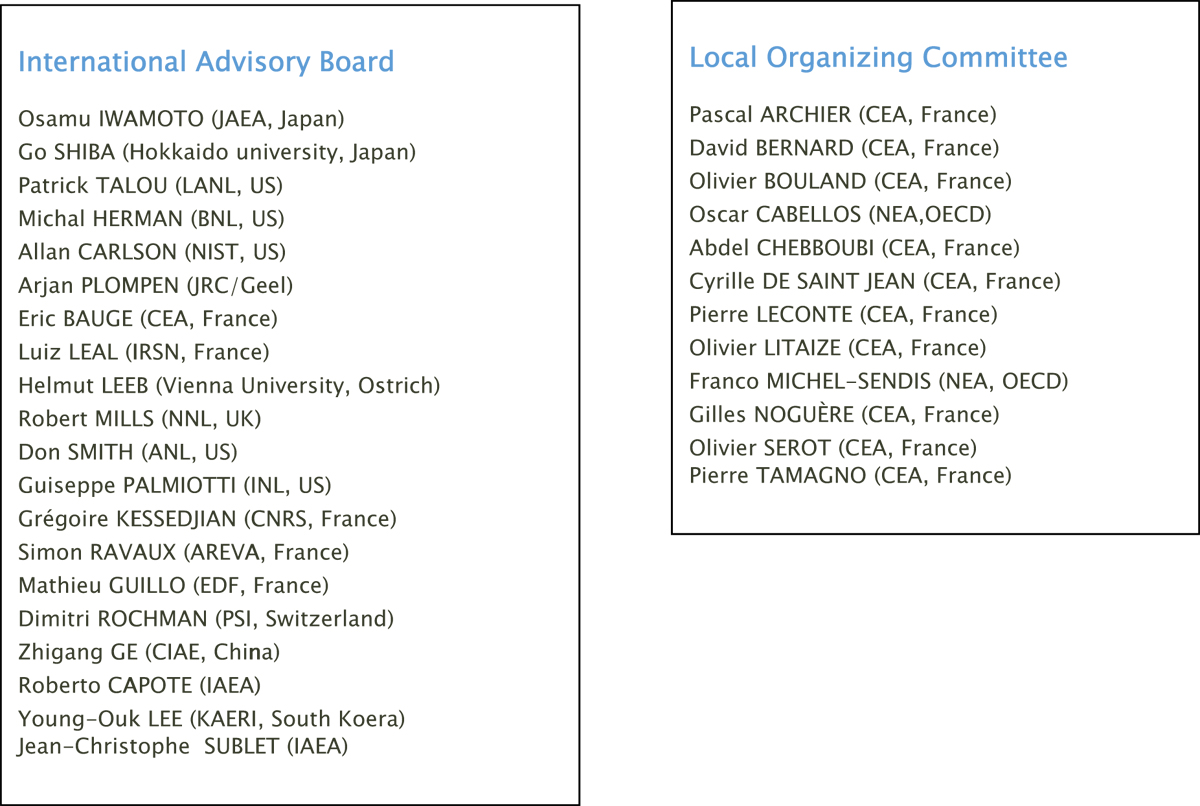| Issue |
EPJ Nuclear Sci. Technol.
Volume 4, 2018
Special Issue on 4th International Workshop on Nuclear Data Covariances, October 2–6, 2017, Aix en Provence, France – CW2017
|
|
|---|---|---|
| Article Number | E1 | |
| Number of page(s) | 3 | |
| Section | Preface | |
| DOI | https://doi.org/10.1051/epjn/2018045 | |
| Published online | 14 November 2018 | |
https://doi.org/10.1051/epjn/2018045
Editorial
Preface by the CW2017 organizers including program, advisory board and photo
Laboratoire d’Etudes de Physique, Saint Paul Lez Durance Cedex, France
Received:
13
August
2018
Published online: 14 November 2018
The fourth edition of the International Workshop on Nuclear Data Covariances, organized by CEA Cadarache and NEA, took place in Aix en Provence, France, October 26, 2017. This workshop is the continuation of the series of workshops held in Port Jefferson, USA (2008), Vienna, Austria (2011) and Santa Fe, New Mexico, USA (2014). It was open to contributions on all aspects of nuclear data covariance evaluations, for all observables (e.g. cross sections, energy and angle spectra, fission yields, and resonance parameters) from the resonance region up to the high energy range, for light to heavy nuclei.


The main topics of the workshop were related to:
-
covariance evaluation methodology (15 talks),
-
nuclear reaction models prior uncertainties and biases (3 talks),
-
measurement breakthrough to evaluate and reduce systematic uncertainties as well as biases (7 talks),
-
nuclear data libraries: status of their covariance files/representation of covariance and formatting issues (3 talks), and
-
applied covariances, from nuclear reaction model parameters to various applied parameters covariances (15 talks).
The number of participants was of about 50 people (for 45 oral presentations), coming from the United States, Europe, China, and Japan. Focused on the problem of uncertainties, this workshop had as main objective to open the future trends in the measurements, nuclear reaction modelling and in the process of nuclear data evaluation. The participation of national and international experts strongly contributed to its undeniable success.
After a general workshop introduction (C. De Saint Jean), an introductory talk was given by M. Salvatores to highlight the importance of nuclear data uncertainties for end-up users (reactors physicists). A last introductory talk, devoted to methods of uncertainties and correlations evaluation coming from other physic or mathematical domains, was then given by M. Munoz-Zuniga (IFPEN) on Bayesian approach for model calibration in the oil and gas management. In the previous conference (organized in 2014 to Santa-Fe), the intensive use of Monte Carlo methods to propagate nuclear data uncertainties towards the applications was particularly observed in various talks. The major trends and advances of this CW2017 conference were related to better treatment of experimental systematic uncertainties such as normalization, detector efficiencies, background reduction,… Various talks given by experimentalists have shown their recent solutions to minimize these kind of uncertainties. In addition, theoreticians and evaluators proposed various advances to better take into account prior nuclear reaction models uncertainties with possible solutions given by more fundamental theories (microscopic ingredients). At last, this workshop has reminded the importance of integral experiments used as validation experiments but sometimes also as part of a more direct evaluation of the nuclear data of interest.
We would like to express our gratitude to all participants for their presentations but also for the fruitful discussions that took place during the conference.

© C. De Saint Jean, published by EDP Sciences, 2018
 This is an Open Access article distributed under the terms of the Creative Commons Attribution License (http://creativecommons.org/licenses/by/4.0), which permits unrestricted use, distribution, and reproduction in any medium, provided the original work is properly cited.
This is an Open Access article distributed under the terms of the Creative Commons Attribution License (http://creativecommons.org/licenses/by/4.0), which permits unrestricted use, distribution, and reproduction in any medium, provided the original work is properly cited.
Current usage metrics show cumulative count of Article Views (full-text article views including HTML views, PDF and ePub downloads, according to the available data) and Abstracts Views on Vision4Press platform.
Data correspond to usage on the plateform after 2015. The current usage metrics is available 48-96 hours after online publication and is updated daily on week days.
Initial download of the metrics may take a while.


